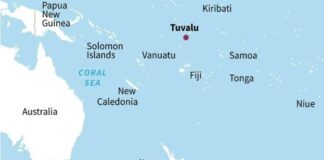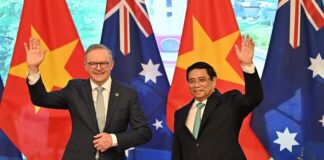Journalists at the influential, liberal-leaning newspaper Southern Weekly in Guangdong province staged a two-day strike against government censorship on January 7 and 8, the first such strike at a major newspaper for more than two decades.
Hundreds of supporters protested peacefully outside the paper’s headquarters in Guangzhou before the police arrested several protesters. High school and college students also showed support with their photos and messages.
It appears the workers may have won a victory, with an agreement was reached on late January 8. Propaganda officials promised to loosen some of the more intrusive controls over content and not to punish Southern Weekly reporters for the strike.
Despite state ownership, China’s media has long been commercialised and media outlets behave increasingly like business. The commercialisation of media has produced space for the growth of investigative and activist reporters. Southern Weekly has over the years published stories of scandals, corruption and protests, gaining a loyal audience among intellectuals, professionals and young Chinese.
The newsroom revolt was sparked by the alteration of a New Year editorial that urged greater respect for rights enshrined in China’s constitutions into a tribute to one-party rule by provincial government propaganda officials. Journalists posted letters of protests, and intellectuals, celebrities, business leaders and journalists joined the condemnation of press censorship on the Chinese version of Twitter, Weibo.
The conflict escalated when a journalist was forced to hand over the paper’s Weibo account to the acting editor-in-chief on January 6. Minutes later a statement was posted under this account claiming that the New Year editorial was written by the newspaper’s own editors. Angered by this outright lie orchestrated by the paper’s management, a number of journalists began to circulate a statement calling for a strike.
What appeared to be a minor incident, “was like the fuse on a detonator”, as one letter posted by the paper’s journalists wrote, after growing tensions since media restrictions were tightened in mid-2012. While the press in China has gained more freedom to publish stories critical of the government, censorship on “sensitive” topics remains prevalent. “More than 1,000 stories were either censored or scrapped altogether last year”, the same letter claimed.
The strike also briefly sparked a revolt in its sister newspaper, Beijing News, after the Central Propaganda Department ordered several dailies to publish an editorial denouncing the strike at Southern Weekly, accusing it of involving “hostile foreign forces” and asserting “party control of the media is an unwavering basic principle.”
The episode was widely discussed on Weibo but critical and satirising comments were quickly deleted. This kind of online discussion has become increasingly frequent in China, not only following explosive political development like the escape of the blind barefoot lawyer Chen Guangcheng, the spectacular downfall of Bo Xilai and the siege of Wukan village, but also abuses of power, corruption and negligence by local officials. How the revolt is handled has been seen in China as a test for the new leadership’s announced commitment to more open-mindedness.
The revolt by journalists against censorship is a victory in the broader push towards freedom of speech and against the government’s authortarian regime. It is an example of people losing their fear to challenge authorities. Increased press freedom may also generate wider support for the social movements and protets that the censorship regime bars journalists from covering.
Michael Keane





